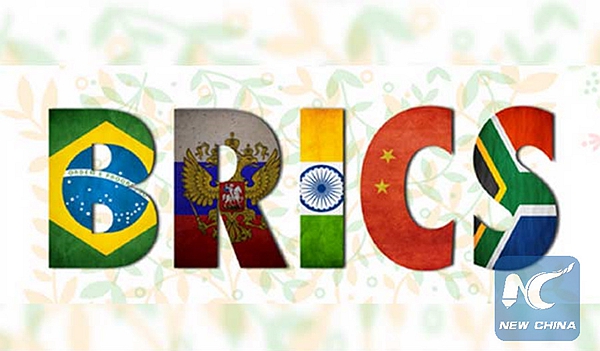BRICS leaders must smoke the peace pipe in Xiamen
- By Earl Bousquet
 0 Comment(s)
0 Comment(s) Print
Print E-mail China.org.cn, August 30, 2017
E-mail China.org.cn, August 30, 2017
|
|
|
The 9th BRICS Summit will be held in Xiamen, Fujian Province, on September 3-5, 2017. [Xinhua] |
When the leaders of Brazil, Russia, India, China and South Africa (BRICS) meet in the picturesque Xiamen City in September for their 9th summit, they will be tested to take the five-member global grouping through its current mild internal convulsions and improve its influence and image on the world stage.
Its size (occupying a great proportion of geographic space), population (43 percent of the world’s total) and share of the global economy (a combined GDP of over $16 trillion) place the BRICS in a position to do much more in the future than in its first 20 years.
But while consolidating internal cooperation, as a unit of developing nations, it also needs to more quickly expand much-needed assistance to smaller developing nations, within the context of South-South Cooperation.
In addition, the grouping needs to build its cohesion as both a single and a united force.
Divisions must therefore be studiously avoided – at all times and by all means.
The Western press is painfully brewing a storm in a tiny teacup about whether all five BRICS leaders will attend the Xiamen Summit, while trying even harder to fan border sparks into nationalistic flames.
But apart from finding ways to allow the sparks to die, the BRICS strategists also have to find reasons and ways to devise concrete plans to forge stronger ties with the large number of smaller and poorer developing nations that dot the world map.
Nations and people in Africa and Asia, the Caribbean and South America, the sinking islands of the world, the pilfered and dependent economies most vulnerable to the volatilities of unequal world trade, growing numbers of victims of wars, catastrophes and disasters – all need life-saving assistance that is usually more easily affordable.
BRICS is now a macro mover in the global economy (controlling over 23 percent of world trade in 2016). It has also almost doubled its share in the last ten years to be the source of over half of all global trade today.
It is therefore imperative for ways and means to be found in Xiamen for BRICS to better help the world’s smaller nations benefit more from its global standing.
For example, the increased voting rights and corresponding influences of two member-states in the International Monetary Fund (IMF) and the World Bank should be translated into motors driving change from within, pushing policy away from the traditional terms and conditions that hinder more than help developing nations.
Nations belonging to the Alliance of Small Island States (AOSIS) are scattered worldwide, but most face the same problems, ranging from size and sustainability to vulnerability to rising sea levels.
The similarly-affected Caribbean Community (CARICOM) grouping’s island economies can undergo a sea-change in fortunes if sustainable tourism ties are built with BRICS nations as part of a common cooperative thrust.
The decisive influence of the BRICS in the new Asian international infrastructure skyline and the huge possibilities opened-up by China’s multinational Silk Road initiative will link dozens of nations across three continents in a big and bold new push towards better international trade across borders, skies and seas.
Here too, BRICS can work with smaller nations globally to find ways to be part of mega-sized projects to both enhance their integration in the new world economy and benefit their populations.
The benefits of small size tend to elude big thinkers tasked with designing mega projects to benefit multiple nations and peoples in different ways across the world. But none can deny that the needs of smaller nations are easier to meet – and results much faster to accomplish.
The BRICS planners will urge the leaders to implement the bigger collaborative projects associated with earlier calls to advance structural reforms, grow innovation and coordinate macro-economic policy, to strengthen its competitiveness and bring vitality into global growth and cooperation.
However, in a new world order in which political chaos and uncertainty have increasingly become the order of the day and global trade is again threatened by protectionism and unilateralism, BRICS nations are equally bound to do what’s necessary to guarantee positive continuity in world trade, as with world peace and security.
But above all, the BRICS leaders will also face in Xiamen some more urgent, immediate tasks that will, by all means, have to be resolved before the summit ends.
A prime one will be to resist the obvious external attempts to crack the BRICS armor by magnifying manageable minor differences between major neighboring member-states, to accelerate and transform them into weakening internal divisions.
With a neighborly territorial dispute starting to threaten historical friendships and differences starting to sound like assuming dangerous proportions, BRICS leaders must smoke the peace pipe together in Xiamen – and leave Fujian with an agreed global plan.
Earl Bousquet is a contributor to china.org.cn, editor-at-large of The Diplomatic Courier and author of an online regional newspaper column entitled Chronicles of a Chronic Caribbean Chronicler.
Opinion articles reflect the views of their authors, not necessarily those of China.org.cn.







Go to Forum >>0 Comment(s)